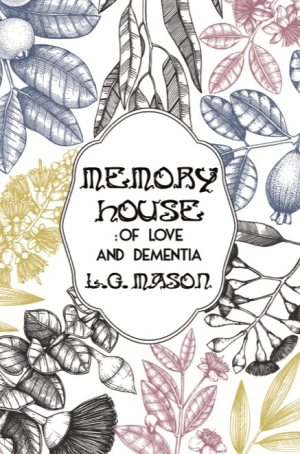Memory House
Of Love and Dementia
Memory House is a subtle, elegiac memoir about love and devotion.
L.G. Mason’s ardent and incisive memoir of a marriage, Memory House, juxtaposes memories of his wife before she developed dementia with the woman she became after its onset.
Chronicling the vicissitudes of a forty-eight year marriage, as well as Mason’s anticipatory grief, the memoir opens on the couple walking in the gardens at Memory House, the assisted living facility where Mason’s wife resides. The narrative that follows is an intimate missive directed at its subject, though with knowledge that she will never read it. Its structure is episodic and nonlinear, moving through succinct recollections, recurrent conversations, wistful remembrances of love and being loved, journal entries, emails, candid quips, and tender observations.
To begin, Mason explains to his wife why she must stay at Memory House despite his “selfish craving” to keep her home and her desire to be “rescued” from such a fate. “When you and I lived together, not so long ago,” he writes, “you wouldn’t let me … keep you clean. Or keep you safe. You hated me for trying. … I let them take you away. I couldn’t face your hatred anymore.”
An octogenarian aware of his own mortality and age-related memory loss, Mason then describes a moment of forgetfulness that spurs him to preserve his beloved in words:
The other day I looked at you and couldn’t find you. … I couldn’t
picture who you used to be.
I panicked. Started going through the stuff I used to put on paper.
Notes and poems and god-knows-what. And things you said, that
I remembered and wrote down.
And I started putting whatever-this-is together. …
And you’re coming into focus. …
Throughout, Mason’s wife is unnamed, and her physical appearance is excluded. She’s preserved as an opera singer, a piano teacher, a cat lover, a grandmother, an atheist—a woman who knows she’s gone “cuckoo” and fears she’s been rendered unlovable. The prose is economic in conveying so, fluctuating between single sentences and longer passages to capture Mason’s wife’s vivacity and languor, as well as his own solitude and gloom.
Written and spoken language are the memoir’s focal point; Mason’s wife’s diminishing capacity for words is used to signal her growing bewilderment. But conversations are also integral to the memoir’s texture and thrust. Lightheartedness, honesty, fear, sadness, and devotion resonate in the couple’s exchanges. Their interconnectedness is apparent, as is the joy and pain that accompanies the lucid and doddering talks they share at Memory House.
Memory House is a subtle, elegiac memoir about love and devotion.
Reviewed by
Amy O'Loughlin
Disclosure: This article is not an endorsement, but a review. The publisher of this book provided free copies of the book and paid a small fee to have their book reviewed by a professional reviewer. Foreword Reviews and Clarion Reviews make no guarantee that the publisher will receive a positive review. Foreword Magazine, Inc. is disclosing this in accordance with the Federal Trade Commission’s 16 CFR, Part 255.

